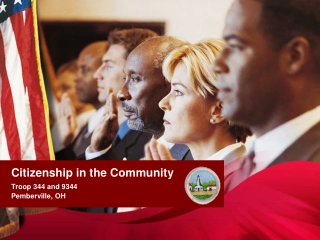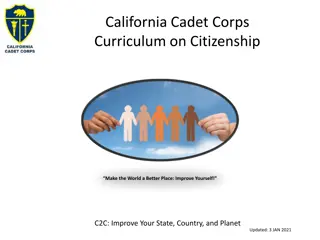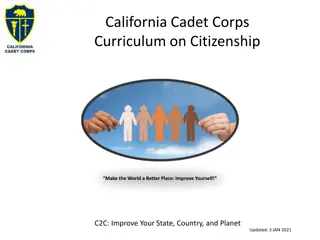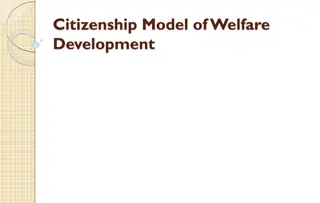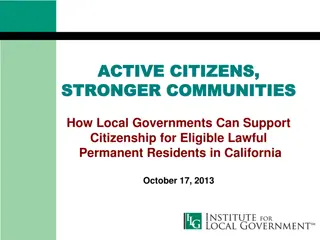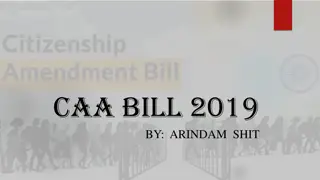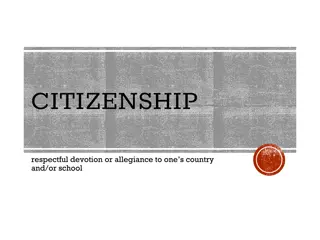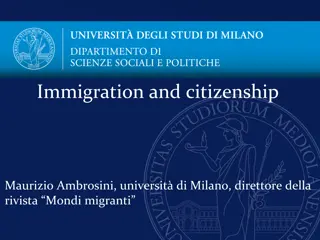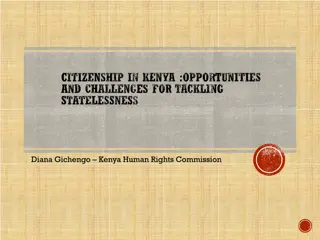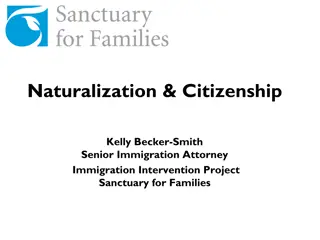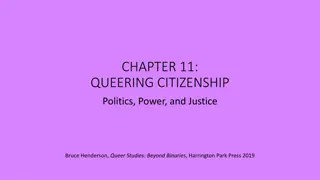
Rights and Responsibilities: Citizenship Principles
This content highlights key aspects of citizenship principles, focusing on rights such as the right to privacy, freedom of religion, expression, and politics. It also emphasizes corresponding responsibilities, like respecting others' beliefs, avoiding spreading hate speech, and ensuring the protection of individual freedoms. These principles form the foundation of a democratic society and promote peaceful coexistence.
Download Presentation

Please find below an Image/Link to download the presentation.
The content on the website is provided AS IS for your information and personal use only. It may not be sold, licensed, or shared on other websites without obtaining consent from the author. If you encounter any issues during the download, it is possible that the publisher has removed the file from their server.
You are allowed to download the files provided on this website for personal or commercial use, subject to the condition that they are used lawfully. All files are the property of their respective owners.
The content on the website is provided AS IS for your information and personal use only. It may not be sold, licensed, or shared on other websites without obtaining consent from the author.
E N D
Presentation Transcript
LIFE ORIENTATION LEVEL 2 TOPIC 4 CITIZENSHIP S.P. MKHWANAZI HARRISMITH CAMPUS
The Right to Privacy o Everyone has the right to privacy. o Which includes the right not to have the person or home searched without a valid warrant. o Not to have their property searched and their possessions seized without their concern. o Also the privacy of their communications invaded. Responsibilities o Make sure you know why your personal information is being collected, how it will be used and whom will it be disclosed to. o Always have the option of not identifying yourself or of using a false name in certain circumstances. o Often ask for your personal information including your health information so you can see if something is not adding up and make corrections.
The Right to Freedom of Religion, Belief and Opinion o Everyone has the right to freedom of conscience, religion, thought, belief and opinion. o Religious observances may be conducted at state or state-aided institutions, provided that those observances follow rules made by the appropriate public authorities, they are conducted on an equitable basis and attendance at them is free and voluntary. o This section does not prevent legislation recognising marriages concluded under any tradition, or a system of religious, personal or family law or systems of personal and family law under any tradition, or adhered to by persons professing a particular religion. Responsibilities o To allow other people to choose and practice the religion of their choice. o Allow others to hold their own beliefs and opinions, without fear or prejudice. o And to also respect the beliefs and opinions of others, their right to express these, even when we may strongly disagree with these beliefs and opinions. o Make sure every individual lives in a free democracy.
The Right to Freedom of Expression o Everyone has the right to freedom of expression. o Which includes freedom of the press and other media, freedom to receive or impart information or ideas, freedom of artistic creativity and academic freedom and freedom of scientific research. o The right in subset does not prolong to publicity for war, provocation of coming up violence or encouragement of hatred that is based on race, ethnicity, gender or religion, and that constitutes incitement to cause harm. Responsibilities o Not to express views which promote hatred, or are based on prejudices with regard to race, ethnicity, gender or religion. o Take responsibility to ensure this right is not abused by ourselves or others. o To not tell or spread lies, and to ensure others are not insulted or have their feelings hurt.
The Right to Politics o Every citizen is free to make political choices. o Which includes the right to form a political party, to participate in the activities of or recruit members for a political party and also to campaign for a political party or cause. o Every citizen has the right to free, fair and regular elections for any legislative body established in terms of the Constitution. o Every adult citizen has the right to vote in elections for any legislative body established in terms of the Constitution and to do so in secret and to stand for public office and, if elected, to hold office. Responsibilities o If you are an adult and above 18 years old, you can vote, and make sure that your vote is secrete in any of the elections. o You need to make sure that you stand for election for yourself. o Respect the rights of others to belong to their designated political parties.
The Right to Citizenship No citizen may be deprived of citizenship. o Responsibilities Making sure that obeying the laws of our country is a priority. o Ensuring that others obey the laws as well. o Contributing in every possible way to making South Africa a great country and a better place. o The Right to Freedom of movement and residence Every individual has the right to freedom of movement and everyone has the right to leave the Republic if they feel the o need to. Every citizen has the right to enter, to remain in and to reside anywhere in the Republic and every citizen has the right o to own a passport. Responsibilities Need to respect and obey the federal, state and local laws. o You must attend on jury if called upon and do all the regulations. o You need to make sure that your passport is up to date and safe. o If needed, pay income tax and other taxes honestly and on time to the authorities. o
The Right to a SafeEnvironment o Everyone has the right to an environment that is not harmful to their health or well-being and to have the environment protected. o Protected for the benefits of present and future generations, through reasonable legislative and other measures that prevent pollution and ecological degradation. o To promote conservation and secure ecologically sustainable development and use of natural resources while promoting justifiable economic and social development. Responsibilities o To promote sustainable development, and the conservation and preservation of the natural environment. o To protect animal and plant-life, as well as the responsibility to prevent pollution, to not litter, and to ensure that our homes, schools, streets and other public places are kept neat and tidy. o In the context of climate change, we are also obliged to ensure we do not waste scarce resources like water and electricity.
The Right toProperty o No one may be deprived of property except in terms of law of general application, and no law may permit arbitrary deprivation of property. o Property may be expropriated only in terms of law of general application for a public purpose or in the public interest and subject to compensation, the amount of which and the time and manner of payment of which have either been agreed to by those affected or decided or approved by a court. o The amount of the compensation and the time and manner of payment must be just and equitable, reflecting an equitable balance between the public interest and the interests of those affected, having regard to all relevant circumstances, including the current use of the property. o Also the history of the acquisition and use of the property, the market value of the property, the extent of direct state investment and subsidy in the acquisition and beneficial capital improvement of the property and the purpose of the expropriation. Responsibilities o Always respect the property of others. o Take pride in and protect both private and public property, and not to take what belongs to other individuals. o Be honest and fair to tenants, and for those who have property, need to give generously to charity and good causes.
The Right to Housing o Everyone has the right to have access to adequate housing. o The state must take reasonable legislative and other measures, within its available resources, to achieve the progressive realisation of this right. o No one may be evicted from their home, or have their home demolished, without an order of court made after considering all the relevant circumstances. No legislation may permit arbitrary evictions. Responsibilities o Take good care of your designated household. o Maintain it at all times and make sure that you are not evicted unfairly. o Provide adequate housing for others and tract them fairly.
The Right to Healthcare, Food, Water and Social Security o Everyone has the right to have access to health care services, including reproductive health care, sufficient food and water and social security, including, if they are unable to support themselves and their dependants, appropriate social assistance. o The state must take reasonable legislative and other measures, within its available resources, to achieve the progressive realisation of each of these rights. o Live a balanced and healthy lifestyle o No one may be refused emergency medical treatment. Responsibilities o As citizens, we need to save water, which is the first important thing to do. o Make sure we keep our water and environment clean and safe from harm. o Properly dispose chemicals, oils, and none biodegradable items, also reduce plastic consumption, this promotes the re- using and recycling. o By doing so, our health will improve, and be in good terms and good condition.

